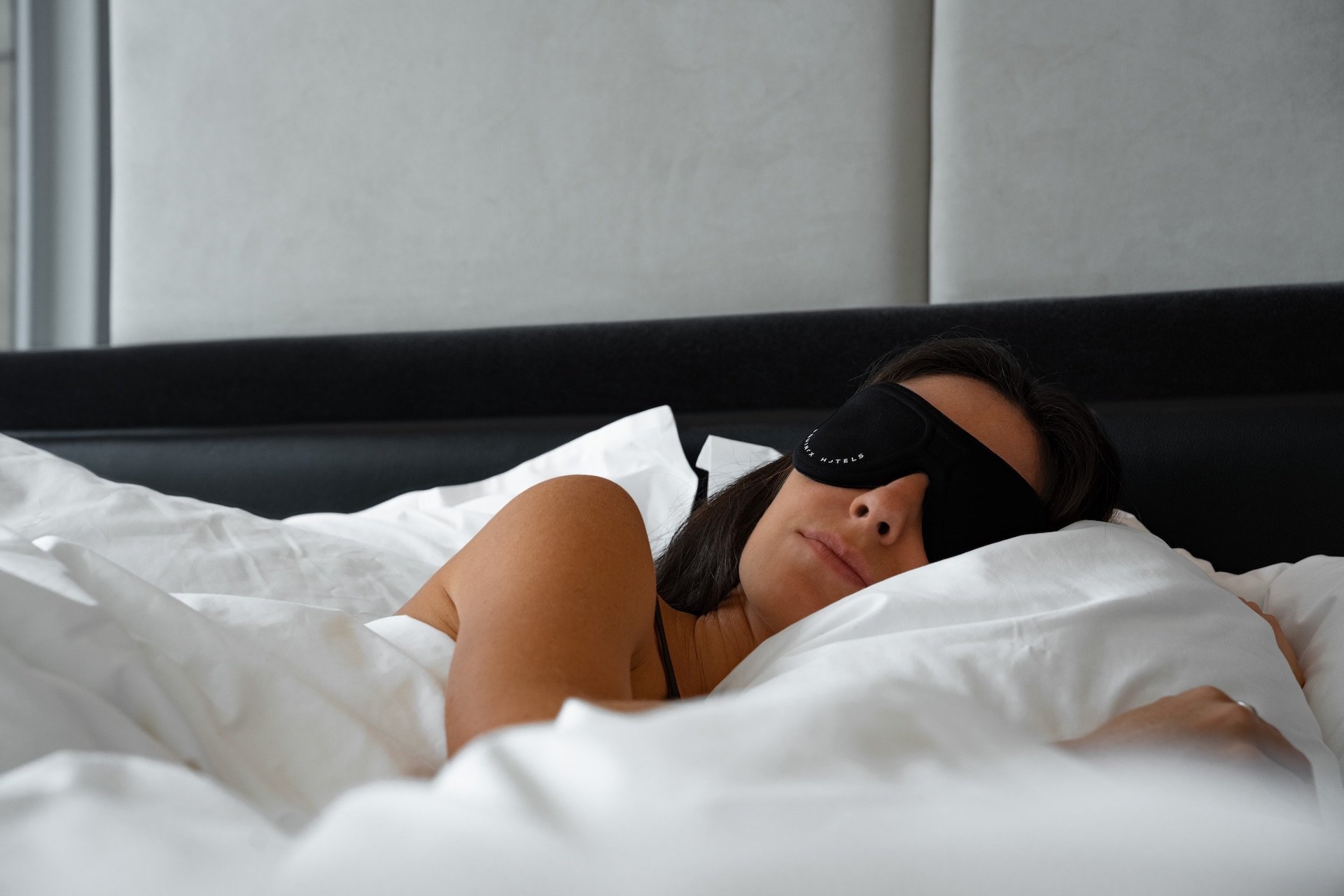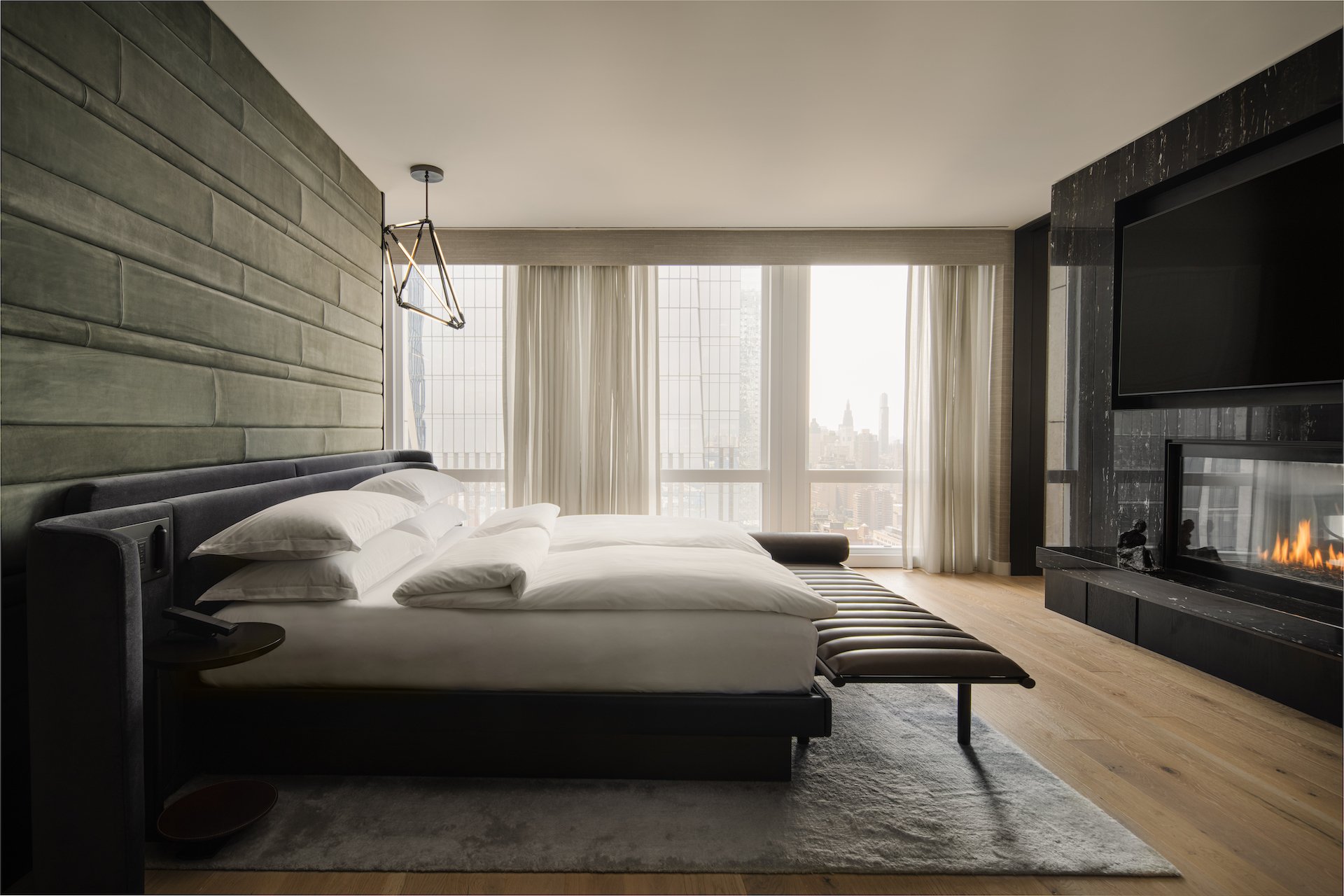8 Tips For Better Sleep, According To An Equinox Sleep Scientist
Snooze-worthy tips for optimizing sleep from Dr. Matthew Walker, author of “Why We Sleep.”

Equinox is best known for its high-end fitness clubs, but the famed gym brand has also operated a wellness-themed luxury hotel in New York City’s Hudson Yards since 2019. Equinox Hotel New York is leaning into the booming sleep tourism trend by partnering with Dr. Matthew Walker, author of Why We Sleep: Unlocking The Power of Sleep and Dreams, and professor of neuroscience and psychology at the University of California, Berkeley. The five-star property—which boasts stylish interiors by The Rockwell Group along with a requisite Equinox health club and Soulcycle franchise—offers plenty of sleep-focused activities for guests seeking a restorative getaway.
Hotel amenities include snooze-centric spa treatments, morning and evening rituals designed to optimize circadian rhythms, and an Art + Science of Sleep program featuring Sleep IV-Drips and “personalized sleep coaching.” The somnolent partnership further utilizes Walker’s expertise with jet lag recovery strategies for guests at the Manhattan wellness resort, a concept that Equinox plans to expand to properties in Saudi Arabia and Europe. Here, Walker shares eight essential sleep tips—one for every hour of ideal nightly slumber. “People don’t respond to rules, they respond to reasons,” he says. “When you know why these strategies work, it’s easier to commit to them.”

1. Anchor Your Internal Clock with Regularity
Reason: “Your circadian rhythm thrives on consistency. Irregular sleep schedules confuse your internal clock, disrupting the quality of your sleep.”
What to Do: “Go to bed and wake up at the same time every day, even on weekends. Keep your schedule within a 30-minute window.”
Why It Works: “Regularity strengthens your biological rhythm, making it easier to fall asleep and wake up refreshed.”
2. Begin Your Day with Morning Light Exposure
Reason: “Light is the primary regulator of your circadian rhythm. Morning light signals your brain to suppress melatonin and helps set your internal clock.”
What to Do: “Spend 10 to 15 minutes outside in natural light within an hour of waking. If outdoor light isn’t available, use a light therapy box.”
Why It Works: “Exposure to morning light helps align your sleep-wake cycle, improving sleep timing and quality.”
3. Wind Down with a Pre-Sleep Routine
Reason: “Your body needs a clear signal to transition from wakefulness to sleep. Stress or overstimulation in the evening disrupts this process.”
What to Do: “Establish a 30 to 60 minute wind-down routine. Engage in calming activities like reading, stretching, or meditation in dim light.”
Why It Works: “A consistent routine tells your brain it’s time to sleep, reducing pre-sleep anxiety and helping you fall asleep faster.”
4. Cool Down for Deep Sleep
Reason: “Your core body temperature naturally drops during sleep. A cooler environment supports this process, aiding both sleep onset and quality.”
What to Do: “Keep your bedroom at 60 to 67 degrees Fahrenheit. Alternatively, take a warm bath or shower an hour before bed to promote a cooling effect.”
Why It Works: “The drop in core temperature signals your body to prepare for deep, restorative sleep.”
5. Sleep in Complete Darkness
Reason: “Light, even at low levels, can suppress melatonin production, disrupting your sleep cycles.”
What to Do: “Use blackout curtains or an eye mask to eliminate light sources. Remove electronics or turn on ‘night mode’ to reduce blue light exposure.”
Why It Works: “A pitch-dark environment promotes melatonin production, ensuring your sleep remains undisturbed.”
6. Eliminate Noise
Reason: “Noise interruptions fragment your sleep, reducing its restorative effects even if you don’t fully wake.”
What to Do: “Use earplugs, white noise machines, or apps to mask disruptive sounds. Alternatively, address noise sources in your home, like creaky doors or loud appliances.”
Why It Works: “A quiet environment supports seamless transitions between sleep stages, maximizing restorative benefits.”
7. Manage Nighttime Stress
Reason: “Stress activates the fight-or-flight response, increasing cortisol levels and preventing restful sleep.”
What to Do: “Practice stress-relief techniques like box breathing, progressive muscle relaxation, or guided meditation. Write down your worries or plans for the next day to clear your mind.”
Why It Works: “Relaxing the nervous system before bed calms your mind and body, promoting deep and uninterrupted sleep.”
8. Align Sleep with Your Chronotype
Reason: “Your chronotype dictates when your body naturally feels sleepy and alert. Ignoring it causes ‘circadian misalignment.'”
What to Do: “Identify your chronotype—morning person, night owl, or intermediate—using the Morningness-Eveningness Questionnaire (MEQ). Adjust your sleep schedule accordingly.”
Why It Works: “Sleeping in sync with your natural biological preference improves sleep efficiency and overall health.”
